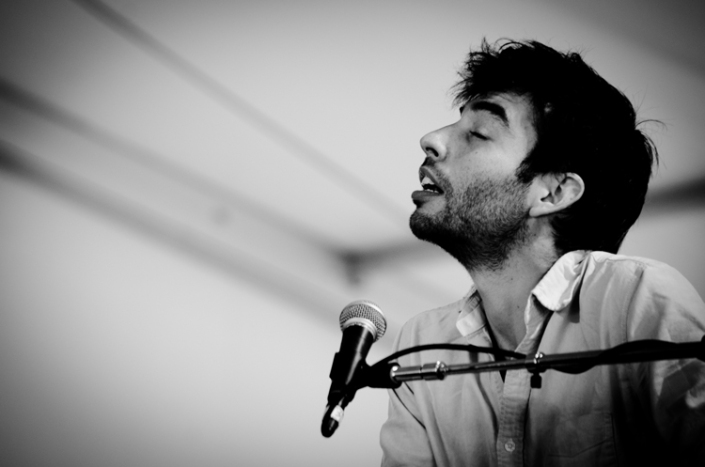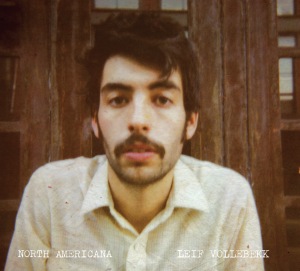Nathaniel Rateliff
‘The Pleasure of the Present’: An Interview with Nathaniel Rateliff
Both Nathaniel Rateliff and I arrived late for his interview. Trying to find somewhere to park along the tangle of one way streets that surrounded our chosen meeting place during AmericanaFest, was quite the challenge the first few times around. Nathaniel walked up the ramp towards the front door of The Rutledge with his guitar in hand, as he was scheduled to take the stage shortly after our interview. He entered with his friends, who just happened to be Caroline Rose and her two band members. We met inside and as I introduced myself he motioned for me to follow and join him at the end of the bar.
We exchanged hellos and he offered me a drink, his treat (An “Americana,” beer, brewed by Yazoo especially for AmericanaFest.Thank you Nathaniel). Nathaniel Rateliff was warm and inviting from that first moment forward. He seemed as at ease and easy to talk with, as I imagine he would be in the comfort of his own home–an effortlessly entertaining host, candid, quick witted and engaging–and he continued as such, both throughout our interview and throughout his amazing performance on the Rutledge stage just moment later that evening. Grab a drink and come join us at the end of the bar for a chat, Nathaniel’s treat..
♦
Lauren Jahoda: The parking is crazy around here.
Nathaniel Rateliff: Yeah. It is. We lucked out with some spots on the street.
LJ: Tell me about your latest release.
NR: Well, it’s actually the third. The first one I did was self released with the help of some friends. That was called Desire and Dissolving Men. The second one was on Rounder Records….uh, there was so much time in between… it’s call In Memory of Loss. The newest one is Falling Faster Than You Can Run.
LJ: I love that album! I was a fan of yours before I started Heartstrings and became an editor.
NR: Awesome!
LJ: Is this your first time performing at AmericanaFest?
NR: It is. I honestly don’t know much about the festival (smiles). I actually didn’t know AmericanaFest was a thing. That goes to show how in the loop I am (laughs, and orders a drink from the bar).
LJ: (Laughs) How do you prepare for your show? Drinking (laughs)?
NR: (Laughs) Sometimes yes, sometimes no. A lot of times I am (laughs). But I try to keep it cool. I’m sure if anyone read that, they would laugh. They’d say, “You don’t keep it cool.” Yeah, I go through phases. I guess, it all really just depends on my mood and whether I’m in a good mood. I’m pretty lazy (laughs).
LJ: Do you prepare your set list ahead of time or do you just wing it?
NR: I’ll write something down. I’ll have a list of songs. We’ll see what happens tonight. There’s a bunch a new songs that I want to play.
LJ: Oh, I can’t wait to hear that!
NR: I just did a record with this R & B/Soul band I have, called the Night Sweats. I’ll do a couple of those. If I’m on tour with the band we kind of do similar stuff every night. It varies a little bit, but that’s the best way to lock in. Back in the day we used to…sometimes we’d be on tour long enough that we’d start making it up…”Yeah, we’ll do blah, blah, blah tonight.” And that’s really great sometimes, but sometimes ya know, it can backfire.
LJ: So when you’re performing do you stick to the same routine?
NR: Sometimes. The comedy parts change. Situational. Yeah.
LJ: I want to talk about “Still Trying.” When and how you repeat “I don’t know” over and over, it’s so emotional. Is that something you planned out when writing the song or did it just happen?
NR: I wasn’t necessarily trying to be extra emotive on those phrases. It just kind of came out that way so I’m just stuck doing it that way (laughs).
LJ: This might sound weird, but I think your album in every aspect is very sexy and romantic – the cover, the songs, the arrangement, the tone, the way you sing it – has anyone ever told you that before (laughs)?
NR: Um. I get told I’m sexy a lot.
LJ: (laughs) That’s a great answer.
NR: I mean it helps that I’m a good cook, great in the sack and I’m a good dancer. That’s my Tinder.
LJ: (laughs) Are you on Tinder?
NR: (laughs) No, I’m not. I’m married. Polyamorous, sort of (laughs). Ah, no. I was a big fan of Leonard Cohen and this sensual side to him. I like that. Sex is important. It’s important in relationships. It’s an important dynamic even for people who don’t even know each other. Not even just intercourse, just when communicating. It can have a real healing property to it.
LJ: Can you tell me a little about your background, where you’re from, when you decided to pursue your music career?
NR: I grew up in Missouri and ya know, did all that. I moved to Colorado in ’98. And I kind of always played music as a kid and was in bands, and I always wanted to be a rock star or whatever and moved to Colorado with my best friend, Joseph Pope, who still plays music with me. And so we sat at Red Rocks and said, “we gotta play here man!!” And now we’ve played there 7 or 8 times or so. Yeah, I’ve wanted to pursue music since I was a kid. I just didn’t know how to go about doing it. I thought I could do it without touring. I used to have a career job at a trucking company. I didn’t really have a high school diploma or a GED and I made good money at that job and I thought this is kind of as good as it’s gonna get. I could potentially make $40,000 a year and support a family and have kids someday. So, ya know, we’d tour on the weekends and my job was always helpful but at some point I thought, I need to take this really seriously. I started gardening and making the same amount of money, and I was able to come and go as I please. But it was a decision where I just had to be like, okay, I have to not be doing this trucking job anymore and do what I want to do. And I did that and yeah, it started to work out. But I mean it’d be 8/9 years and without any place to stand really (laughs). I was in South Carolina and we were saying that it only takes 7 or 8 years to make money but I’m still not making money.
LJ: Yeah. Everyone says the same thing.
Bill Scorzari: There’s that old saying: I’ve been working for years on my overnight success.
NR: Yeah. Just this last year, I was like oh yeah, the last couple of years we’ve made money. Of course, I don’t have any work at the end of November and December and I’m supposed to go to Europe in January so that’s going to put a damper on things. It costs a lot of money to get the band over there.
LJ: Yeah. Where in Colorado do you live?
NR: Denver.
LJ: I interviewed Gregory Alan Isakov the other day. He’s lives in Colorado and he’s a gardener too.
NR: Yeah, he actually got a degree in horticulture. He’s pretty interesting. He actually paid off all his tuiton because he started a gardening business on the side while he was studying horticulture. He paid off all his student debt before he was out of school. And he’s a great example of someone who’s been working for years and doing it his way and it’s paid off.
LJ: Yeah. It’s really nice being able to interview a handful of people who all know each other well and who respect one another so much. Something I love that you do when you sing is that you just speak, rather than sing. I love that. Is that intentional?
NR: I think it’s more of a Leonard Cohen rip off thing.
LJ: You really like Leonard Cohen.
NR: A lot. Yeah. My first record was more of the Leonard Cohen type of stuff. Yeah, I don’t know. I’ve always liked that kind of stuff.
LJ: There’s something very humbling about it. It feels much more like a one-on-one experience between listener and musician.
NR: Yeah.
(Nathaniel’s manager walks over just before Liz Longley’s set begins)
LJ: Well, I know you have to get ready for your show here tonight, so I just want to thank you for speaking with me.
NR: Oh, no. Thank you so much. Sorry I was late.
LJ: No problem. I’m looking forward to hearing your performance tonight.
NR: Thanks. Thanks for coming.
♦
We stayed for Nathaniel’s incredible performance on the Rutledge stage, where he effortlessly captivated the crowd with the candor of his music and wit–a fully engaging host and consummate performing artist. After talking with Nathaniel and experiencing his live show, I can’t help but marvel at the dichotomy of this incredibly talented and engaging man so passionately singing “I don’t know. I don’t know. I don’t know a God damn thing.” Nathaniel knows a lot about what’s important in life, and it’s clearly what he knows that is the force behind his music. The next day I arrived at the airport, picked up a copy of the New York Times outside security, got on the plane headed to my home in New York, sat down and began reading. There, within the first few pages of the Sunday Review, was an article entitled Too Young to Die, Too Old To Worry, written by Jason Karlawish. In the article Karlawish talked about Leonard Cohen and how Cohen had, as planned, resumed smoking at the age of 80, after having quit for so many years. Karlawish posed the question — “When should we set aside a life lived for the future and, instead, embrace the pleasures of the present?” — a question that all of the musicians I interviewed during AmericanaFest expressed they have confronted at one time or another; a question that we all have or will confront at one time or another. It is no trivial question. It is in fact, weighty, and profoundly so. While Nathaniel’s former job at the trucking company gave him security, he instead made the decision to actively pursue what he wanted to, and risked it all to be able to fully embrace the passion that drives him instead– his music. It’s a decision for which we, as listeners, are extremely grateful.
Gondola Sessions? Sign Me Up!
By: Lauren Jahoda
Mountains…check. Music…check. Gondola…check! The Gondola Sessions is just about the neatest idea I’ve heard of since SerialBox Presents. They recruit bands for live acoustic performances inside surrogate recording booths, also known as gondolas, while gliding through the sky amidst the mountains of Aspen/Snowmass, Colorado. Rayland Baxter, Elephant Revival, Bombino and Steep Canyon Rangers (who will be the subject of a HEARTSTRINGS feature article soon), are among the knock-out musicians they’ve hosted already. It really just doesn’t get much better than that.
Keep an eye out for the upcoming release of Nathaniel Rateliff’s Gondola Session, and debut album Falling Faster Than You Can Run which is stunning all who are fortunate enough to listen.
For now, start with Rayland Baxter’s performance of “Willy’s Song” on the Gondola:



